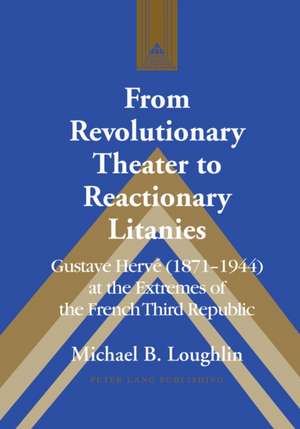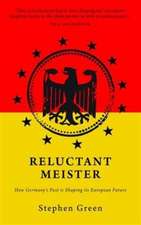From Revolutionary Theater to Reactionary Litanies: Gustave Herve (1871-1944) at the Extremes of the French Third Republic: Studies in Modern European History, cartea 71
Autor Michael B. Loughlinen Limba Engleză Hardback – 29 dec 2015
Din seria Studies in Modern European History
-
 Preț: 386.67 lei
Preț: 386.67 lei -
 Preț: 359.58 lei
Preț: 359.58 lei -
 Preț: 568.91 lei
Preț: 568.91 lei - 23%
 Preț: 651.88 lei
Preț: 651.88 lei - 8%
 Preț: 519.04 lei
Preț: 519.04 lei -
 Preț: 292.98 lei
Preț: 292.98 lei -
 Preț: 434.49 lei
Preț: 434.49 lei -
 Preț: 539.29 lei
Preț: 539.29 lei -
 Preț: 434.11 lei
Preț: 434.11 lei - 23%
 Preț: 627.71 lei
Preț: 627.71 lei - 23%
 Preț: 649.23 lei
Preț: 649.23 lei - 27%
 Preț: 702.12 lei
Preț: 702.12 lei - 27%
 Preț: 779.17 lei
Preț: 779.17 lei - 8%
 Preț: 506.30 lei
Preț: 506.30 lei - 23%
 Preț: 628.59 lei
Preț: 628.59 lei - 23%
 Preț: 594.76 lei
Preț: 594.76 lei - 23%
 Preț: 613.18 lei
Preț: 613.18 lei - 23%
 Preț: 670.44 lei
Preț: 670.44 lei -
 Preț: 371.26 lei
Preț: 371.26 lei - 5%
 Preț: 237.28 lei
Preț: 237.28 lei - 6%
 Preț: 306.73 lei
Preț: 306.73 lei -
 Preț: 392.50 lei
Preț: 392.50 lei - 20%
 Preț: 430.20 lei
Preț: 430.20 lei - 20%
 Preț: 441.17 lei
Preț: 441.17 lei
Preț: 974.06 lei
Preț vechi: 1334.34 lei
-27% Nou
Puncte Express: 1461
Preț estimativ în valută:
186.41€ • 202.41$ • 156.58£
186.41€ • 202.41$ • 156.58£
Carte tipărită la comandă
Livrare economică 23 aprilie-07 mai
Preluare comenzi: 021 569.72.76
Specificații
ISBN-13: 9781433131004
ISBN-10: 1433131005
Pagini: 1100
Dimensiuni: 155 x 230 x 69 mm
Greutate: 1.88 kg
Editura: P LANG
Seria Studies in Modern European History
ISBN-10: 1433131005
Pagini: 1100
Dimensiuni: 155 x 230 x 69 mm
Greutate: 1.88 kg
Editura: P LANG
Seria Studies in Modern European History
Notă biografică
Michael B. Loughlin has taught history and political science at Ohio Northern University for the past 27 years. At ONU Loughlin represented the university on the World Affairs Council of Greater Cincinnati until 2007 and since 1996 as coordinator for Phi Beta Delta, whose ONU chapter has won several regional and national awards in the past decade. During that time he has continued his research on Gustave Hervé and published several articles in The Journal of Contemporary History, European Review of History/Revue Européenne D'Histoire, the Proceedings of the Western Society for French History, and Beregynia. 777. Owl: The Journal. Loughlin's research has been constantly expanded since his PhD dissertation «The Political Transformation of Gustave Hervé, 1871-1944», completed at Indiana University in 1987 under the direction of William B. Cohen.
Cuprins
Contents: «Un Breton de Bretagne Bretonnante» «Le Drapeau dans le Fumier» - «Un Commis Voyageur Du Socialisme» - L'Association Internationale Antimilitariste and L'Affiche Rouge of 1905 - The Foundation of La Guerre Sociale: Activist Journalism or Revolutionary Theater? - Journalists and Prisoners: Hervé and the Staff at La Guerre Sociale - The Midi Crisis, the Socialist Congresses at Nancy and Stuttgart and the First Campaigns - The Draveil-Villeneuve-Saint-Georges Strike and Demonstrations - The Postal Strikes of 1909, the Francisco Ferrer Affair, and the Liabeuf Affair - Le Parti Révolutionnaire and Le Comité Révolutionnaire Antiparlementaire (C.R.A.) - The Railroad Strike of 1910 and the Origins of Le Retournement - The Aernoult-Rousset Affair - Les Jeunes Gardes Révolutionnaires (J.G.R.) and Le Service de Sûreté Révolutionnaire (S.S.R.) - La Rectification du Tir and Le Nouvel Hervéisme - From «La Bataille de la Salle Wagram» Until the July Crisis - La Grande Guerre: Gustave Hervé and the Origins of a French National Socialism - The Postwar Crisis in France - Le Parti Socialiste National of 1919 - De-population and De-Christianization - La Victoire and Its Director During the Interwar: Plus Ça Change Plus Ça La Même Chose - Financial and Circulation Problems at La Victoire - Le Parti de la République Autoritaire - The Reawakened Parti Socialiste National and the Elections of 1928 - The Syndicats Unionistes and the Milice Socialiste National - Interwar Foreign Policy: The Increasingly Turbulent Eye Between Two Storms - Gustave Hervé and Anti-Semitism - The Stavisky Affair and the Events of February 6, 1934 - C'est Pétain qu'il nous faut! - The Popular Front and Hervé's Return to His Ancestral Faith - Hervé's Interwar Reactions to Fascism and Nazism - Hervé, World War II, and Vichy.









